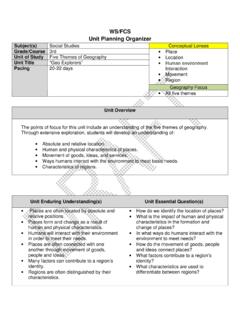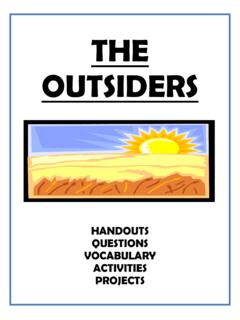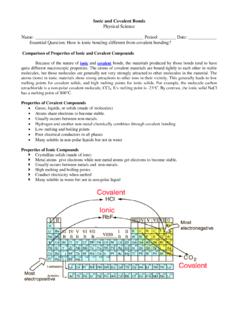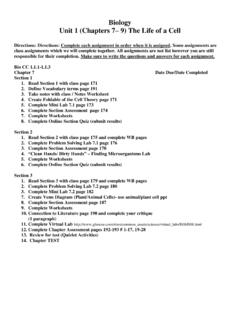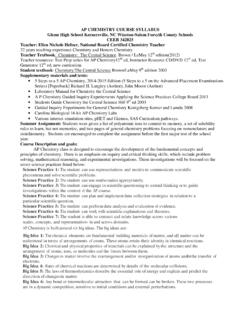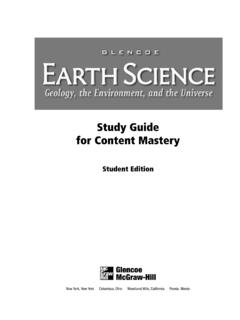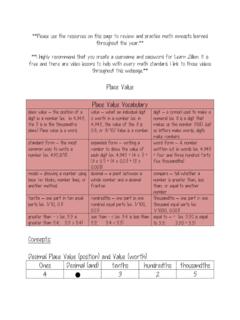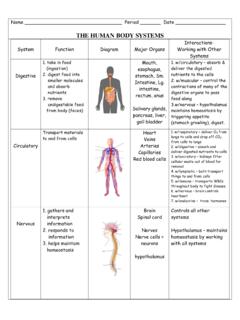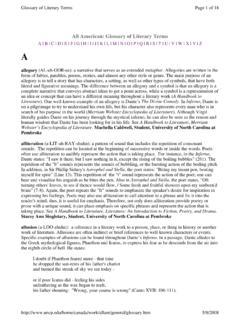Transcription of AP English Poetry Terms
1 AP English Literature | literary Terms | Sabolcik Listed and defined below are literary Terms that you will (most likely) need to know in order to discuss and write about works of literature. You are already familiar with many of these. 1. acatalectic - A "normal" line of Poetry with the expected number of syllables in each line, as opposed to a catalectic line (which is missing an expected syllable) or a hypercatalectic line (which has one or more extra syllables than would normally be expected, perhaps due to anacrusis). 2. allegory - The word derives from the Greek allegoria ("speaking otherwise"). The term loosely describes any writing in verse or prose that has a double meaning. This narrative acts as an extended metaphor in which persons, abstract ideas, or events represent not only themselves on the literal level, but they also stand for something else on the symbolic level.
2 An allegorical reading usually involves moral or spiritual concepts that may be more significant than the actual, literal events described in a narrative. Typically, an allegory involves the interaction of multiple symbols, which together create a moral, spiritual, or even political meaning. The act of interpreting a story as if each object in it had an allegorical meaning is called allegoresis. 3. alliteration- the repetition of identical or similar consonant sounds, normally at the beginnings of words. Gnus never know pneumonia is an example of alliteration since, despite the spellings, all four words begin with the n sound. 4. allusion- a reference in a work of literature to something outside the work, especially to a well-known historical or literary event, person, or work. When Eliot writes, "To have squeezed the universe into a ball" in "The Love Song of J.
3 Alfred Prufrock," he is alluding to the lines "Let us roll our strength and all/ Our sweetness up into one ball" in Marvell's "To His Coy Mistress." 5. alter ego - A literary character or narrator who is a thinly disguised representation of the author, poet, or playwright creating a work. Some scholars suggest that J. Alfred Prufrock is an alter ego for T. S. Eliot in "The Love Song of J. Alfred Prufrock," 6. anachronism - placing an event, person, item, or verbal expression in the wrong time period. ex: from Julius Caesar Brutus: Count the clock! (no clocks in Roman times out of place time-wise) 7. anadiplosis - (Greek "doubling"): Repeating the last word of a clause at the beginning of the next clause. As Nietzsche said, "Talent is an adornment; an adornment is also a concealment." 8. anagnorisis - is a moment in a play or other work when a character makes a critical discovery.
4 Anagnorisis originally meant recognition in its Greek context, not only of a person but also of what that person stood for. Anagnorisis was the hero's sudden awareness of a real situation, the realization of things as they stood, and finally, the hero's insight into a relationship with an often antagonistic character in Aristotelian tragedy. 9. anaphora- the repetition at the beginning of clauses. ex: "We shall not flag or fail. We shall go on the end. We shall fight in France. 10. anastrophe - inverted order of words or events as a rhetorical scheme. ex: Yoda: Begun, the Clone War has! 11. antihero- A protagonist who is a non-hero or the antithesis of a traditional hero. While the traditional hero may be dashing, strong, brave, resourceful, or handsome, the antihero may be incompetent, unlucky, clumsy, dumb, ugly, or clownish. Examples here might include the senile protagonist of Cervantes' Don Quixote or the girlish knight Sir Thopas from Chaucer's "Sir Thopas.
5 " In the case of the Byronic and Miltonic antihero, the antihero is a romanticized but wicked character who defies authority, and becomes paradoxically ennobled by his peculiar rejection of virtue. 12. anthimeria - artfully using a different part of speech to act as another in violation of the normal rules of grammar. This switch might involve treating a verb like a noun, or a noun like a verb, or an adjective like a verb, and so on. In Nancy Sinatra's song "These Boots Are Made for Walkin'" has a speaker who tells the implied audience, "You keep lying when you ought to be truthing.. You keep saming when you ought to be changing." 13. anthropomorphism - In anthropomorphism, the object or animal is actually doing something human. With personification, the object or animal just seems like it's doing something human. Describes the human forms of greek gods/ goddesses with human characteristics.
6 He fog grew legs, grabbed a partner, and waltzed through the hills to the tune of 'Piano Man. 14. antihero - Central character who lacks all the qualities traditionally associated with heroes. May lack courage, grace, intelligence, or moral scruples. 15. antithesis- a figure of speech characterized by strongly contrasting words, clauses, sentences, or ideas, as in Man proposes; God disposes. Antithesis is a balancing of one term against another for emphasis or stylistic effectiveness. The second line of the following couplet by Alexander Pope is an example of antithesis: The hungry judges soon the sentence sign, And wretches hang that jury-men may dine. 16. aphorism - an original thought, spoken or written in a laconic (concise) and memorable form.[1] The oft-cited first sentence of this work is: Life is short, art long, opportunity fleeting, experience deceptive, judgment difficult.
7 17. aporia - (Greek: "impassable path") The deliberate act of talking about how one is unable to talk about something. For instance, "I can't tell you how often writers use aporia." 18. apostrophe- a figure of speech in which someone (usually, but not always absent), some abstract quality, or a nonexistent personage is directly addressed as though present. Following are two examples of apostrophe: Papa Above! / Regard a Mouse. -Emily Dickinson Milton! Thou shouldst be living in this hour; / England hath need of thee .. Wordsworth 19. apotropaic - Designed to ward off evil influence or malevolent spirits by frightening these forces away. In many cultures, elaborate artwork depicting monsters would be created to have an apotropaic affect. For instance, the fierce "celestial dogs" (Fu dogs) carved outside the entrance to Tibetan temples would keep evil spirits from entering the holy ground, and Amerindian shamans would wear frightening, grotesque "medicine masks" when they visited sick members of their tribe to terrify the evil spirits making them sick.
8 It has been suggested that the presence of gargoyles and grotesques on medieval cathedrals is a remnant of older pagan practices, in which monstrous apotropaic figures would be carved on the front of ships and over the entrances to buildings to ward off evil influences. 20. archetype - a collectively inherited unconscious idea, pattern of thought, image, etc., universally present in individual psyches. Archetypes can refer to a constantly recurring symbol or motif in literature, painting or mythology. This usage of the term draws from both comparative anthropology and Jungian archetypal theory. ex: Odysseus as the archetype of the wandering hero 21. assonance- the repetition of identical or similar vowel sounds. A land laid waste with all its young men slain repeats the same a sound in laid, waste, and slain. 22. aubade - a morning love song (as opposed to a serenade, which is in the evening), or a song or poem about lovers separating at dawn.
9 It has also been defined as "a song or instrumental composition concerning, accompanying, or evoking daybreak" 23. authorial voice - The voices or speakers used by authors when they seemingly speak for themselves in a book. (In Poetry , this might be called a poetic speaker). The use of this term makes it clear in critical discussion that the narration or presentation of a story is not necessarily to be identified with the biographical and historical author. Instead, the authorial voice may be another fiction created by the author. It is often considered poor form for a modern literary critic to equate the authorial voice with the historical author, but this practice was common in the nineteenth century. However, twentieth-century critics have pointed out that often a writer will assume a false persona of attitudes or beliefs when she writes, or that the authorial voice will speak of so-called biographical details that cannot possibly be equated with the author herself.
10 In the early twentieth-century, New Critics also pointed out that linking the authorial voice with the biographical author often unfairly limited the possible interpretations of a poem or narrative. Finally, many writers have enjoyed writing in the first person and creating unreliable narrators--speakers who tell the story but who obviously miss the significance of the tale they tell, or who fail to connect important events together when the reader does. Because of these reasons, it is often considered naive to assume that the authorial voice is a "real" representation of the historical author. 24. ballad meter- a four-line stanza rhymed abcd with four feet in lines one and three and three feet in lines two and four. O mother, mother make my bed. O make it soft and narrow. Since my love died for me today, I ll die for him tomorrow.
